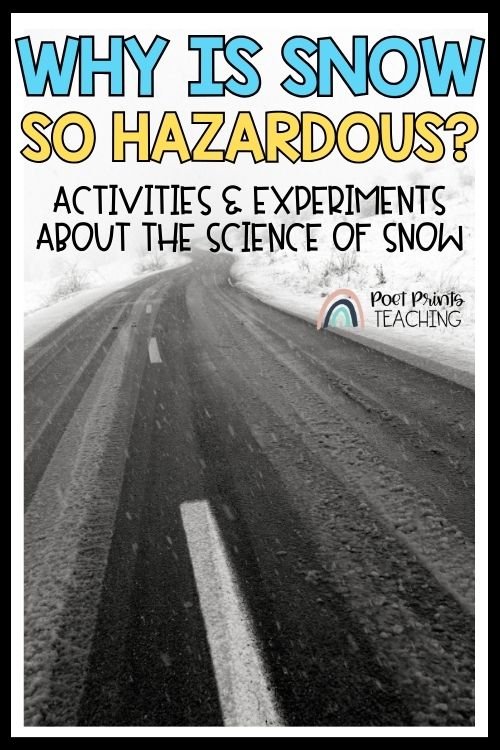Winter Science Experiments about Snow for Kids
What do you think about when you see snow in the forecast? Snowflakes falling from the sky? Children building snowmen? A snow day closure at school? Back pain from shoveling? Terrible driving conditions? Snow has its ups and downs for sure! Regardless of your thoughts about snow, there are some awesome science activities about snow for third grade!
What is Snow? Why is it Hazardous?
Snow is made from water vapor (a form of gas) in clouds high in the sky. When temperatures in a cloud drop below freezing, the water vapor freezes to form crystals. If the cloud gets too heavy, these crystals will fall as snow.
While snow is beautiful and fun to play in, it also creates hazards. These hazards include dangerous driving conditions, damage to homes and powerlines, and whiteout conditions.
Ways to prepare for these conditions could be staying inside, dressing warmly, having flashlights handy, and having a supply of non-perishable food and bottled water.
Snow Science and Literacy
Learn all about snow with this easy-to-teach lesson set.
Scripted lessons… check!
Nonfiction Reading… check!
Hands-On Science Experiment… check!
Assessment… check!
Videos about Snow
Here are a few videos about snow and snow hazards:
Peekaboo Kidz - The Dr Binocs Show “SNOWFLAKES”
Snow and Blizzards Nonfiction Reading
Reading about snow and blizzards is a great place to start. Check out these grade-appropriate reading passages on Snow & Its Hazards, and Blizzards.
Each passage also comes with comprehension questions. The blizzard passage comes in two reading levels and two versions of the reading comprehension activity.
Art Integration -Snowflake Art Projects
There are some amazing snowflake art projects that you could do with your students. Here are a few ideas:
Wax Resist Snowflakes: This is a simple project that has radical results. Have students use a white crayon or oil pastel to draw a snowflake on a white piece of paper. They will have to press hard to get the best result.
After they’ve finished drawing the snowflake, use watercolor paint to paint over the crayon. The oil from the crayon or pastel will resist the paint and the snowflake will pop. If you look up Wax Resist Snowflake Art on Google, there will be dozens of examples.
Catching Snowflakes Art: This is a classic art project where students draw themselves catching snowflakes.
Pattern Block Snowflakes Art: This is a great way to combine science, art, AND math,
Snowball Fight STEM Challenge
In this snowball fight STEM challenge, students are challenged to design a device that will launch a cotton “snowball” the furthest distance. Students will design, test, and execute their launch in this fun take on a snowball fight!
weather-related hazards, BLIZZARD PREPAREDNESS activity
A fun way to engage students in determining ways to prepare for a blizzard is to create a shopping list and a To-Do list. You could do this as a whole group or have students create their own lists by using the snow preparedness To-Do list template in this resource.
These are just a few of the fantastic ideas out there for teaching snow and its hazards. Have fun!






